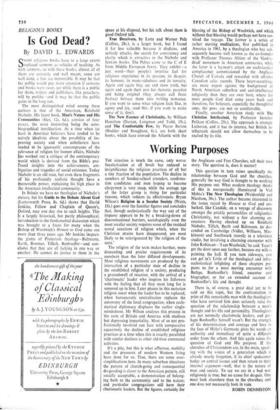Working Purposes
THE situation is much the same, only worse. Secularisation at all levels has reduced to insignificance the religious practices of all but a tiny fraction of the population. The decline in numbers of Sunday-school attenders, confirma- tion candidates and men hoping to become clergymen is very steep, while the average age of the latter group is rising for particular reasons, which reduces its effectiveness. Bryan Wilson's Religion in a Secular Society (Watts, 15s.) goes over the familiar figures and concludes that, though ecclesiastically the way out of the impasse appears to be by a breaking-down of denominational barriers, sociologically even the most secular society requires some of the residual moral sanctions of religion which, when the Christian strains have disappeared, are most likely to be reinvigorated by 'the religion of the sects.'
The religion of the sects makes harsher, more demanding and precise requirements of its members than the later diffused developments. Most religious movements are produced by the interaction of a particular state of decline in the established religion of a society, producing a groundswell of reaction, with the arrival of a `charismatic' leader who inspires his followers with the feeling that all they most long for is summed up in him. Later phases in this sectarian religion occur when the leader has to be replaced, when bureaucratic centralisation replaces the autonomy of the local congregation, when eccle- siastical diplomacy displaces the earlier single- mindedness. Mr Wilson analyses this process in the sects of Britain and America with studious but depressing impartiality. Most of us not pro- fessionally involved can face with comparative equanimity the decline of established religious practices at a time when this is exactly paralleled with similar declines iu other old-time communal activities.
It's a pity, but this is what affluence, mobility and the pressures of modern Western living have done for us. True, there are some over- simplifications here. In many suburban situations the pattern of church-going and consequential do-gooding is closer to the American pattern, still socially acceptable, a demonstration of belong- ing both to the community and to the nation; and particular congregations still have their charismatic leaders. But the figures, certainly for the Anglicans and Free Churches, tell their own story. The question is, does it matter?
This question in turn raises specifically the relationship between God and the churches, generally the way God is thought to be working His purpose out. What modern theology thinks of this is unexpectedly illuminated in Ved Mehta's The New Theologian (Weidenfeld and Nicolson, 36s.). The author became interested in the issues raised by Honest to God and em- barked, like Candide, on a voyage of discovery amongst the prickly personalities of religionless Christianity, not without a few alarming en- counters. Having checked up on Reinhold Niebuhr, Tillich, Barth and Bultmann, he des- cended on Cambridge (Vidler, Williams, Mac- kinnon) and Southwark (mostly in a television studio, but involving a charming encounter with John Robinson—'! am Woolwich,' he said. 'I can't get the door open any further, because my wife is painting the hall. If you turn sideways, you can get in'). Little of the theological and infra- ecclesiastical infighting of these chapters pre- pares us for a most moving encounter with Bethge, Bonhoeffer's friend, executor and biographer, or for an extended account of Bonhoeffer's life and thought.
There is, of course, a great deal yet to be said on this topic, but the confrontation in print of this remarkable man with the theologians who have survived him does seriously raise the question of the relationship between a man's thought and his life and personality. Theologians are not normally charismatic leaders, and per- haps Bonhoeffer himself wasn't. But the strength of his determination and courage and love in the face of Hitler's Germany gives his words an authority and immediacy of quite a different order from the others. And this again raises the question of God and His purpose. If the churches of Christendom are, in the main, speak- ing with the voices of a generation which is already nearly forgotten, if its chief spokesmen hedge on central isssues and then return to their internal argument—well, that is the nature of man and society. To say we are in a bad way religiously is true, but no cause for despair. One must look elsewhere than to the churches; and one does not necessarily look in vain.
ROBIN DENNISTON


































 Previous page
Previous page